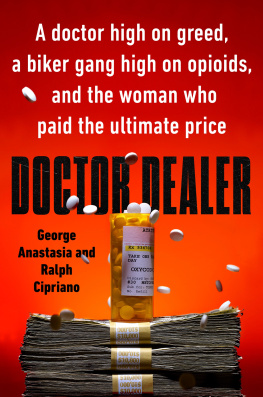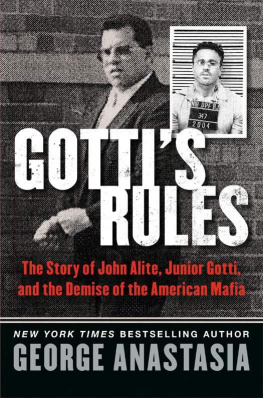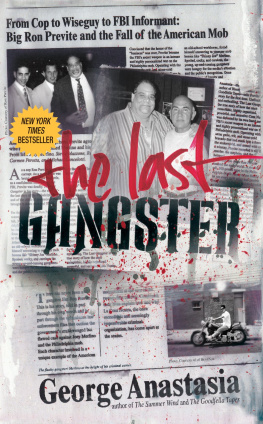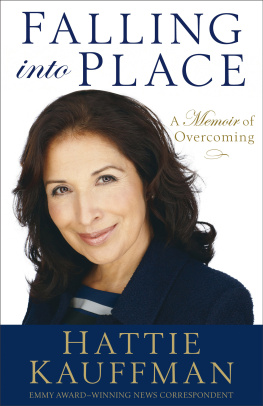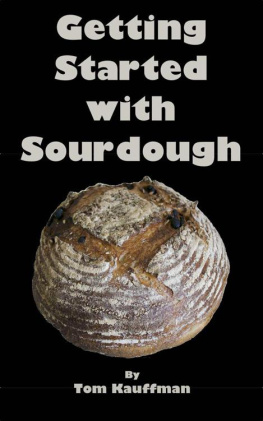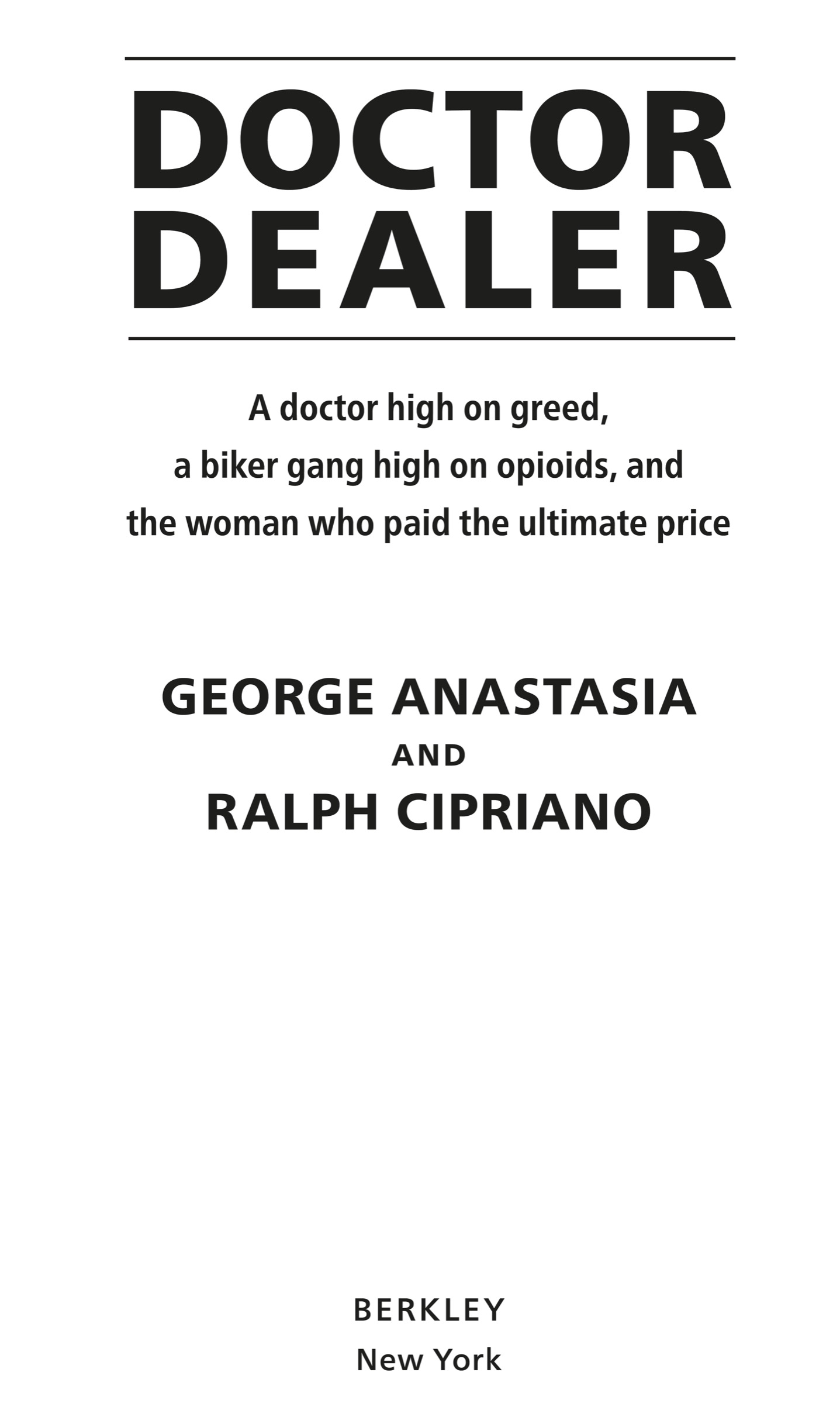Other books by George Anastasia
Blood and Honor: Inside the Scarfo Mobthe Mafias Most Violent Family
Mobfather: The Story of a Wife and Son Caught in the Web of the Mafia
The Goodfella Tapes
The Summer Wind: Thomas Capano and the Murder of Anne Marie Fahey
The Last Gangster
Gottis Rules: The Story of John Alite, Junior Gotti, and the Demise of the American Mafia
Other books by Ralph Cipriano
Target: The Senator: A Story about Power and Abuse of Power
The Hit Man: A True Story of Murder, Redemption and the Melrose Diner
Courtroom Cowboy: The Life of Legal Trailblazer Jim Beasley
BERKLEY
An imprint of Penguin Random House LLC
penguinrandomhouse.com

Copyright 2020 by George Anastasia and Ralph Cipriano
Penguin Random House supports copyright. Copyright fuels creativity, encourages diverse voices, promotes free speech, and creates a vibrant culture. Thank you for buying an authorized edition of this book and for complying with copyright laws by not reproducing, scanning, or distributing any part of it in any form without permission. You are supporting writers and allowing Penguin Random House to continue to publish books for every reader.
BERKLEY and the BERKLEY & B colophon are registered trademarks of Penguin Random House LLC.
Library of Congress Cataloging-in-Publication Data
Names: Anastasia, George, author. | Cipriano, Ralph, author. Title: Doctor dealer : a doctor high on greed, a biker gang high on opioids, and the woman who paid the ultimate price / George Anastasia and Ralph Cipriano.
Description: First edition. | New York : Berkley, 2020. | Includes index.
Identifiers: LCCN 2019059055 (print) | LCCN 2019059056 (ebook) | ISBN 9780593097762 (hardcover) | ISBN 9780593097779 (ebook)
Subjects: LCSH: Kauffman, James, -2018. | Kauffman, April, -2012. | Murder for hire--New Jersey--Case studies. | Motorcycle gangs--New Jersey--Case studies. | Medication abuse--New Jersey--Case studies.
Classification: LCC HV6533.N3 A53 2020 (print) | LCC HV6533.N3 (ebook) | DDC 364.152/3092--dc23
LC record available at https://lccn.loc.gov/2019059055
LC ebook record available at https://lccn.loc.gov/2019059056
Jacket image by Bill Diodato / Getty Images
Jacket design by Steve Meditz
While the authors have made every effort to provide accurate telephone numbers, Internet addresses and other contact information at the time of publication, neither the publisher nor the authors assume any responsibility for errors, or for changes that occur after publication. Further, publisher does not have any control over and does not assume any responsibility for author or third-party Web sites or their content.
pid_prh_5.6.0_c0_r0
PROLOGUE
Journalism in its purest sense is the search for the truth. That search involves gathering as many facts as possible from as many different sources as can be found. But reporters who have been at the game for a while understand that knowing the facts doesnt necessarily mean you know the truth.
The murder of April Kauffman, which occurred on May 10, 2012, is a case in point.
Freddy Augello, a scruffy former boss of an outlaw biker gang known as the Pagans, was convicted in October 2018 of orchestrating the murder of the vivacious South Jersey radio host, who was found shot to death in the bedroom of the home she shared with her husband, Dr. James Kauffman, an endocrinologist.
The verdict was pretty much a slam dunk. The jury, which had heard testimony for about two weeks, took a little more than two hours to find Augello guilty of every charge he faced in the high-profile case.
A few months later, he was sentenced to life plus thirty years.
Im not John Gotti, the ponytailed sixty-two-year-old biker said in a lengthy and rambling statement in which he denied any involvement in the murder and in a drug ring he was convicted of heading.
Ordinarily a conviction and sentencing would signal the end of the story.
But there is nothing ordinary about the April Kauffman murder case.
April and James Kauffman had been married for a little more than ten years when she was killed. April, according to her adult daughter and many of her friends, was not happy in her marriage and wanted out. April also slept around. She had asked her husband several times for a divorce. He refused.
James Kauffman was a doctor with patients who loved and respected him. At the same time, he was a liar and a spendthrift who used his medical practice to generate tens of thousands of dollars in illegal income. He was running a pill mill with Augello and the Pagans, writing bogus prescriptions for the opioid oxycodone that the bikers sold on the streets. He was also a player in two lucrative insurance-fraud schemes, one of which generated tens of millions of dollars in illegal income for those involved.
But the good doctor never had to answer for any of that.
In January 2018, three weeks after being charged with paying Augello $50,000 to have April killed, James Kauffman committed suicide. He hanged himself in his jail cell.
The triggerman hired by Augello to carry out the murder also turned up dead. Originally it was thought he died of a drug overdose. Now authorities are trying to determine whether he was murdered.
For nearly five years, the investigation into April Kauffmans death went nowhere. The case was full of questions without answers. Facts without truth.
Journalists learn early in their careers that reporting is built around answers to the four Wswho, what, where and when. Those questions are answered with facts. But good stories are the ones that focus on the fifth Wwhy. Sometimes facts are not enough to answer that question.
After two years of research that included sitting through the Augello trial, interviewing key players in the story, reviewing hundreds of pages of investigative documents and listening to hours of recorded conversations, we continue to wrestle with that fifth W.
This book is based on all the information available. The story is fortified by extensive interviews with two individuals whose lives were changed as a result of what happened to April Kauffman.
Andrew Glick, a member of the Pagans and onetime close friend of Freddy Augello, has spent hours sitting in a diner in South Jersey recounting his story. The six-foot, two-hundred-twenty-pound outlaw biker was a key government witness in the case, agreeing to secretly record conversations with Augello and others while working with authorities.
He stepped out of the biker underworld following his arrest in November 2017 on drug-dealing and weapons charges. Looking at forty years in prison, he said the choice to cooperate was easy. Glick, who had a Pagans Motorcycle Club tattoo that stretched from his right shoulder to his elbow, was self-deprecating and matter-of-fact as he detailed his life as a biker and his lucrative career as a meth and cocaine distributor. Those were part-time jobs, he explained. He worked forty hours a week in a real job. He was a chef.
Not exactly the stereotypical motorcycle gangbanger, Glick owned rental properties and lived in a sprawling $300,000 house on seven partially wooded suburban acres with his wife and two dogs just outside of Atlantic City, New Jersey. There was a swimming pool in the backyard, along with several outbuildings, including a garage where he worked on motorcycles and a large shed that served as a biker clubhouse.

